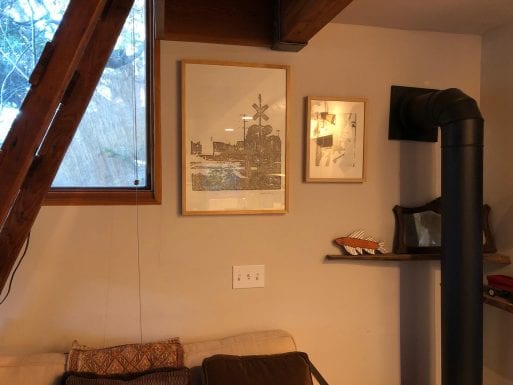This is the story of Travis and his girlfriend Melody as told to Jeanette Summers. Our “Opening Our Hearts” stories are based on people’s real-life experiences. By sharing these experiences publicly, we hope to help our readers feel less alone in their grief and, ultimately, to aid them in their healing process. In this story, Travis reflects on how his girlfriend could laugh at her own death. He discusses his memorable romantic experiences with Melody, her unmatched capacity for meanness, and her lengthy illness and eventual death from cancer.
Melody died of cancer at the age of 43. She had a luminous smile, a brilliantly creative mind, a wicked sense of humor, and an unmatched capacity for meanness. Melody could bewitch you with her seductive charm, and then either swaddle you in love or leave you wounded, bleeding and humiliated. To me — Melody did both.
A flaw that marred Melody’s striking beauty was a keloid scar on her neck: the result of tumors that pushed on her windpipe. She’d had them removed when she was a teenager. Maybe she carried a premonition that her cancer would return one day because throughout the year we were together — the first time around — Melody would talk and laugh at her own death all the time. It would usually happen during our late-night pillow-talks: “What are you going to wear to my funeral?” she’d ask. “Do you think you’ll deliver a eulogy?” I hated it when she talked like that. It felt gruesome, morbid, and deeply unnecessary. I’d always put a pin in it. I couldn’t understand why she’d want to go there.
I have a pretty easy-going personality. Everyone I know would agree that it’s pretty hard to pick a fight with me. But Melody was a fiery person. She managed to target my weaknesses and sensitivities like no one else could, to poke and prod at them in a way that would provoke an explosive reaction. She could fill me with rage and just as quickly, erase that rage and replace it with laughter. Our relationship was tumultuous: constant combat on one hand, but on the other — constant laughter, constant physical passion. But anything that extreme usually proves to have a short shelf-life. We burned out quickly.
Over the span of two or three years after our breakup, Melody met someone else, married him, moved to his native France, and gave birth to their baby boy. During this time, we were pretty much entirely out-of-touch. But I found out the news from a mutual friend: Melody was nursing and noticed that her breasts were perpetually red, hot, and swollen. She had it checked out in Europe, and the doctor there said that it was related to breastfeeding and she had nothing to worry about. But the inflammation persisted, and Melody’s intuitive alarm bells were ringing at a volume she couldn’t ignore: something wasn’t right. When she came back to California for a visit (her U.S. health insurance was still valid at the time), she figured she might as well get a second opinion. What the American doctor told her was shocking: She was showing signs and symptoms of what he thought might be inflammatory breast cancer — an extremely rare, aggressive, fast-moving disease. She was told to go to an oncologist straight away. That doctor’s suspicions were spot-on. The diagnosis was quickly confirmed, and Melody was told she had about a year and a half to live.
Melody and her little family moved back to the United States for good. Once I heard about what was happening to my ex-girlfriend, it took me some time to decide to reconnect with her. When I did, it was instant and completely natural. We quickly became the best of friends, and I got to know Melody’s husband and son.
Even though Melody’s initial prognosis was the stuff of nightmares, she was one resilient fighter of a woman. She survived for almost a decade longer than expected. In the process, Melody wrote a memoir about her experience with cancer that was, of course, imbued with her signature sardonic wit. Melody refused to stop laughing at her own death, even when what she was going through was painful, scary, and humiliating.
Melody went through repeated cycles of diagnosis — treatment — remission — recurrence. She’d seem to be cured — her hair would grow back, the color would return to her face, strength and vitality would surge through her again — and then, inevitably, cancer would crop up in another region of her body: her liver, her spine. Through it all, Melody’s personality didn’t change much. She was still larger-than-life, still outrageously funny and independent, still cutting in her pointed cruelty. She often lashed out at her husband, talked down to him in public in a way that would make me wince in secondhand embarrassment. I’ll never understand why she was so terrible to a man who was so patient, so devoted, and so loyal for so long. But eventually, Melody drove him away. He decided to pursue a legal separation. Some time passed before Melody — my good friend at this point — became my lover again.
It was different this time: My ex-girlfriend, always so strong, healthy, and robust, had undergone a mastectomy. She was bald. Her marriage was disintegrating. Naturally, she wasn’t 100 percent the same incendiary force she was in the first incarnation of our relationship — how could she be? — but it didn’t matter. Connecting with this woman was a blessing, a gift, a uniquely beautiful experience that I could never recreate.
To say that it was crushing to watch the woman I loved so deeply repeatedly get sick, get better, and get sick again would be a colossal understatement. You see, in the beginning, we all thought Melody was going to die. She accepted this reality; in turn, we were all working to come to terms with it, too. But every time she’d go into remission, that process of working to come to terms would be interrupted. Our hope would be restored, only to be trampled twofold a few months later. It was as if every time she triumphed over one bout of cancer and laughed at her own death, she’d win a battle. But ultimately she lost the war. The cancer spread to Melody’s brain, and less than a year later, she was dead.
But before Melody reached that point of no return — before brain cancer ate her up, body and mind — her dark humor was still in full swing. I remember how almost a year before Melody died — around Halloween-time — we were on a real zombie-flick kick. We’d stay up late into the night watching “The Walking Dead” on my living room sofa. One afternoon, we went costume-shopping. Melody — always agile, coordinated, and athletic — stumbled. She said that she felt as if there was a shoelace wrapped tightly around her big toe: an expected symptom of her tumors, no doubt. “It’s happening,” she said, a fear that I’d never seen in her before flashing in her eyes. “Well,” I said, “maybe you should just go as a zombie this year. This way, stumbling around will be a part of your costume.” The fear in Melody’s eyes dissolved. She cracked a wide grin and let out a cackle. The two of us were doubled over in the aisle; we couldn’t stop laughing.
Melody stayed ferociously, stubbornly strong — for her son, for herself, for the people who loved her. She refused to accept anyone’s pity. She’d drive herself from Oakland to Stanford and back multiple times a week for targeted radiation. Around this time, doctors were pumping her with heavy doses of prednisone. The drugs made her edgy, wired, and extra-mean. One day in November, when I had a friend visiting from out-of-town, Melody asked if I could drive her to a doctor’s appointment. Looking back, I realize that this must have made her feel very vulnerable since she usually resisted help at all costs. Maybe that’s why she lost it on me when I said that sure, of course I’d drive her, but let me try to figure out scheduling since I have a guest. Melody felt abandoned, rejected — low on my totem of priorities, which was the absolute opposite of true. But just like that — after everything we’d been through over the course of almost 10 years — Melody brutally and unapologetically booted me from her life.
About a week later, Melody sent an email blast to everyone in her address book: Amma, the hugging saint, was coming to town. Melody was going and wanted to know if anyone would like to join. I thought that Melody was extending an olive branch — offering a chance for us to reconcile, to hug it out and move on. I responded by saying, “Sure, I’d love to go.” She wrote back saying, “I didn’t mean to send this to you. You’re not invited. I’d be embarrassed to be seen in public with you.” I knew what Melody could be like, but still — her ruthlessness shocked me, stunned me, shook me to my core. How could she just cut me out? How could she say such searingly cruel things to me? Maybe it was the drugs. Maybe she knew her time was running out, and it was easier for her to separate from me on an angry note, rather than a loving one, which would leave us both so deeply sad. Any which way, it was heartbreaking for me.
We reconnected when Melody invited me to her birthday party in January. I went with mixed feelings. On one hand, I felt spurned and betrayed — disposable to Melody. On the other hand, I loved her so much, and knew, deep in my bones, that her remaining time on Earth was on borrow. I had to spend every possible second in her company, no matter how she’d treated me or why.
Melody never apologized for what happened a few months prior — she didn’t have it in her to apologize — but we began speaking again, and stayed actively connected for the rest of her life. She died the following August.
The last few months were almost unbearable to watch. This woman — always a warrior, even under duress that most people would collapse beneath the weight of — was on 24-hour bed rest in her family’s home. She became weak, emaciated, and exhausted. Her skin turned sallow and wan, shadows closed in around her once bright-brown eyes, and dementia stole her singular most powerful weapon: her humor. Death was — bit by bit — extinguishing her fire before my eyes, and there was nothing anyone could do to stop it. Melody was unrecognizable; her own son was afraid to climb onto her bed.
I wasn’t present during Melody’s final moments, but I drove to her family’s house as soon as I got the call. When I got there, I saw that someone had placed nickels on Melody’s closed eyelids: an ancient tradition. Legend has it that the dead need to pay a ferryman to usher them across the River Styx and into the underworld. It was strikingly odd, but fascinating and strangely beautiful to me. I was captivated.
I spent a long time lingering over Melody’s lifeless body. I thought that seeing her this way would be gut-wrenching. Strangely, though, I felt okay. It was only when two strangers arrived, zipped my lover’s body into a bag, placed it on a gurney, and took her away that the finality of it hit me: Melody was undeniably, irreversibly gone. I’d never feel her warmth or hear her laugh again. She would no longer laugh at her own death — it had finally come.
It’s been five years. To this day, I still feel the urge to call Melody and tell her something that she, and only she, would laugh at. Despite the merciless sharpness of her tongue and the way she could damage me — seemingly without remorse — I’ve never felt so known or understood by another human being. Melody is impossible to replace. I could never forget her — in all her beauty, her poison, and her power — even if I wanted to.

 My Fun Girlfriend Could Laugh at Her Own Death
My Fun Girlfriend Could Laugh at Her Own Death






 First the Wealth Gap, Now the U.S. Has a Growing Health Gap
First the Wealth Gap, Now the U.S. Has a Growing Health Gap
 How to Comfort A Dying Loved One
How to Comfort A Dying Loved One
 Our Annual Seven Holiday Gifts for Someone Who Is Grieving, 2024 Edition
Our Annual Seven Holiday Gifts for Someone Who Is Grieving, 2024 Edition














